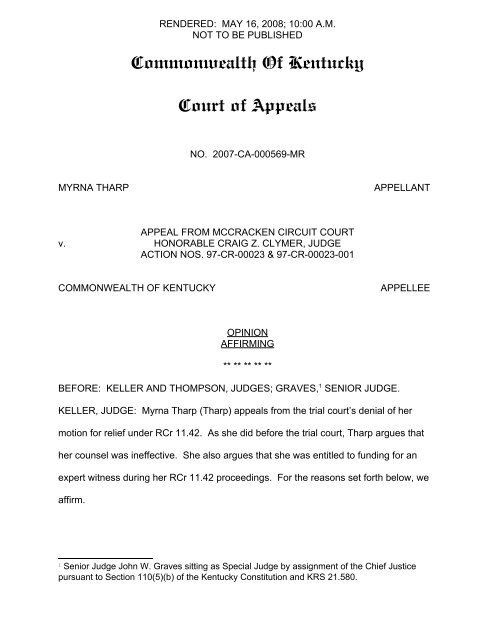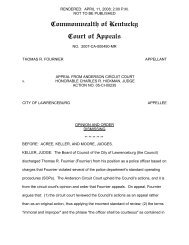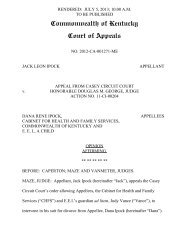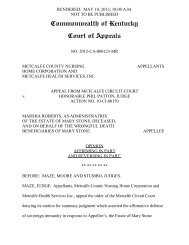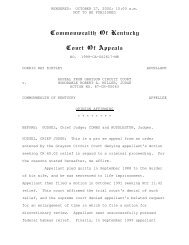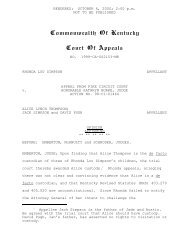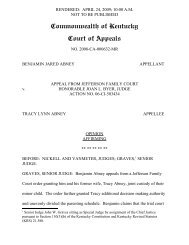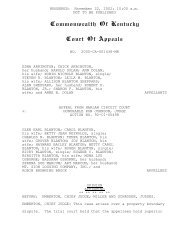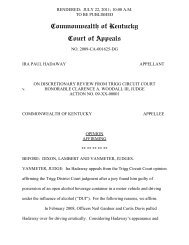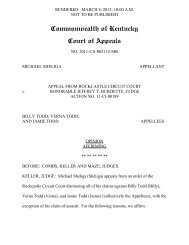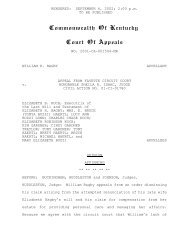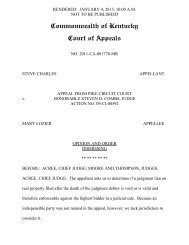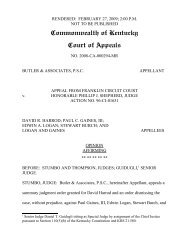Commonwealth Of Kentucky Court of Appeals - Justia
Commonwealth Of Kentucky Court of Appeals - Justia
Commonwealth Of Kentucky Court of Appeals - Justia
Create successful ePaper yourself
Turn your PDF publications into a flip-book with our unique Google optimized e-Paper software.
RENDERED: MAY 16, 2008; 10:00 A.M.<br />
NOT TO BE PUBLISHED<br />
<strong>Commonwealth</strong> <strong>Of</strong> <strong>Kentucky</strong><br />
<strong>Court</strong> <strong>of</strong> <strong>Appeals</strong><br />
NO. 2007-CA-000569-MR<br />
MYRNA THARP APPELLANT<br />
APPEAL FROM MCCRACKEN CIRCUIT COURT<br />
v. HONORABLE CRAIG Z. CLYMER, JUDGE<br />
ACTION NOS. 97-CR-00023 & 97-CR-00023-001<br />
COMMONWEALTH OF KENTUCKY APPELLEE<br />
OPINION<br />
AFFIRMING<br />
** ** ** ** **<br />
BEFORE: KELLER AND THOMPSON, JUDGES; GRAVES, 1 SENIOR JUDGE.<br />
KELLER, JUDGE: Myrna Tharp (Tharp) appeals from the trial court’s denial <strong>of</strong> her<br />
motion for relief under RCr 11.42. As she did before the trial court, Tharp argues that<br />
her counsel was ineffective. She also argues that she was entitled to funding for an<br />
expert witness during her RCr 11.42 proceedings. For the reasons set forth below, we<br />
affirm.<br />
1 Senior Judge John W. Graves sitting as Special Judge by assignment <strong>of</strong> the Chief Justice<br />
pursuant to Section 110(5)(b) <strong>of</strong> the <strong>Kentucky</strong> Constitution and KRS 21.580.
FACTS<br />
We take the underlying facts from the Supreme <strong>Court</strong> <strong>of</strong> <strong>Kentucky</strong>’s 2000<br />
opinion on Tharp’s direct appeal.<br />
On January 11, 1997, Elaina Curtis, age ten months, died<br />
from a ruptured spleen which allegedly resulted from<br />
physical abuse inflicted by her stepfather, Kenneth Tharp.<br />
Medical examinations <strong>of</strong> the child's body also revealed<br />
severe bruises <strong>of</strong> the legs, abdomen, chest, forehead, left<br />
eye, scalp and the back <strong>of</strong> the head. Some <strong>of</strong> the bruises<br />
were estimated to be seven days old or older. There were<br />
also fractures <strong>of</strong> the left ulnar and <strong>of</strong> another bone just above<br />
the ankle joint, the latter estimated to be seven to eight days<br />
old and the former estimated to be a month old. A<br />
radiologist opined that the fractures were caused by two acts<br />
<strong>of</strong> deliberate child abuse occurring on two separate<br />
occasions.<br />
Kenneth Tharp and his wife, Appellant Myrna Tharp, the<br />
child's mother, were indicted by a McCracken County Grand<br />
Jury on charges <strong>of</strong> wanton murder and criminal abuse in the<br />
first degree. Kenneth was also indicted as a persistent<br />
felony <strong>of</strong>fender in the first degree. A motion for separate<br />
trials was granted, RCr 9.16, and Appellant's case was tried<br />
first. Appellant testified that she had never witnessed her<br />
husband abusing Elaina and had never observed anything<br />
seriously wrong with the child until shortly before her death.<br />
However, she had previously given statements to the police<br />
in which she admitted (1) that she had observed her<br />
husband beat the child with his fists on occasions prior to<br />
January 11, 1997; (2) that she saw her husband strike Elaina<br />
with his fists on January 11, 1997, knocking the child from<br />
side-to-side, and that she told him to stop hitting the child,<br />
but then left the room and closed the door behind her,<br />
leaving the child alone with her husband; and (3) that later<br />
that same day, she saw her husband throw Elaina to the<br />
floor, but thought he was just “playing” with the child. Shortly<br />
thereafter, Appellant observed blood in Elaina's diaper and<br />
that she was having difficulty breathing. An ambulance was<br />
called, but efforts to save the child's life were unsuccessful.<br />
Appellant was convicted <strong>of</strong> wanton murder by complicity and<br />
<strong>of</strong> criminal abuse in the second degree, and was sentenced<br />
to a total <strong>of</strong> twenty-seven years in the penitentiary.<br />
Tharp v. <strong>Commonwealth</strong>, 40 S.W.3d 356, 359 (Ky. 2000).<br />
-2-
After a thorough review, the Supreme <strong>Court</strong> affirmed Tharp’s conviction.<br />
Tharp then filed a motion for relief under RCr 11.42. In her motion, Tharp stated that<br />
she “was married to Kenneth Tharp, a man who frightened her, but who had not in the<br />
past ever, to her knowledge, harmed her children physically. [She] had no knowledge<br />
<strong>of</strong> Kenneth’s abuse <strong>of</strong> Elaina until it was too late and Elaina was fatally injured.”<br />
Tharp also made a number <strong>of</strong> allegations regarding deficits in the<br />
performance <strong>of</strong> her counsel (counsel) at trial. The allegations pertinent to this appeal<br />
include: (1) her attorney smelled <strong>of</strong> alcohol during the trial which “may account for his<br />
lack <strong>of</strong> investigation and preparation;” (2) that he failed to “investigate Kenneth Tharp’s<br />
background to establish his prior criminal acts and his violent nature”; and (3) that he<br />
failed to adequately investigate her relationship with Kenneth Tharp. The trial court<br />
summarily denied Tharp’s motion. Tharp appealed that denial to this <strong>Court</strong>, which<br />
reversed and remanded because the trial court had not determined whether Tharp’s<br />
allegations could be resolved on the face <strong>of</strong> the record. On remand, the trial court found<br />
that Tharp’s allegations regarding ineffective assistance <strong>of</strong> counsel related to counsel’s<br />
alleged intoxication were not refuted by the record; therefore, the court ordered an<br />
evidentiary hearing.<br />
Following the evidentiary hearing, the court denied Tharp’s motion, finding<br />
no evidence <strong>of</strong> ineffective assistance <strong>of</strong> counsel. It is from the court’s order denying her<br />
motion that Tharp appeals.<br />
Tharp argues before us that her trial counsel was ineffective for two<br />
reasons: (1) he was intoxicated during the trial; and (2) he should have obtained a<br />
domestic violence expert to establish that Tharp was abused and therefore unable to<br />
appreciate the threat to her daughter or to stop her husband from killing her daughter.<br />
Tharp also argues that the trial court erred during the RCr 11.42 proceedings when it<br />
-3-
failed to provide funding so that she could obtain expert testimony regarding her<br />
husband’s abuse and its impact on her. We will set forth additional facts as necessary<br />
as we discuss these issues.<br />
STANDARD OF REVIEW<br />
In an RCr 11.42 proceeding, the movant has the burden “to establish<br />
convincingly that he was deprived <strong>of</strong> some substantial right which would justify the<br />
extraordinary relief afforded by the post-conviction proceedings . . . .” Dorton v.<br />
<strong>Commonwealth</strong>, 433 S.W.2d 117, 118 (Ky. 1968). When the trial judge conducts an<br />
evidentiary hearing, a “reviewing court must defer to the determinations <strong>of</strong> fact and<br />
witness credibility made by the trial judge.” Sanborn v. <strong>Commonwealth</strong>, 975 S.W.2d<br />
905, 909 (Ky. 1998).<br />
In considering ineffective assistance <strong>of</strong> counsel, the reviewing court must<br />
focus on the totality <strong>of</strong> evidence before the trial judge and assess the overall<br />
performance <strong>of</strong> counsel throughout the case in order to determine whether the identified<br />
omissions or actions overcome the presumption that counsel rendered reasonable<br />
pr<strong>of</strong>essional assistance. See United States v. Morrow, 977 F.2d 222, 229 (6th Cir.<br />
1992); Kimmelman v. Morrison, 477 U.S. 365, 106 S.Ct. 2574, 91 L.Ed.2d 305 (1986).<br />
A convicted defendant claiming ineffective assistance <strong>of</strong><br />
counsel has the burden <strong>of</strong>: (1) identifying specific errors by<br />
counsel; (2) demonstrating that the errors by counsel were<br />
objectively unreasonable under the circumstances existing at<br />
the time <strong>of</strong> trial; (3) rebutting the presumption that the<br />
actions <strong>of</strong> counsel were the result <strong>of</strong> trial strategy; and (4)<br />
demonstrating that the errors <strong>of</strong> counsel prejudiced his right<br />
to a fair trial.<br />
Simmons v. <strong>Commonwealth</strong>, 191 S.W.3d 557, 561-2 (Ky. 2006), cert. denied, ___ U.S.<br />
___, 127 S.Ct. 1132 (2007), 166 L.Ed.2d 908.<br />
Tharp’s claim that she should have been provided funding so that she<br />
could obtain expert evidence in her RCr 11.42 litigation raises an issue <strong>of</strong> law and our<br />
-4-
eview <strong>of</strong> that is de novo. Carroll v. Meredith, 59 S.W.3d 484, 489 (Ky. App. 2001); see<br />
also A & A Mechanical, Inc. v. Thermal Equipment Sales, Inc., 998 S.W.2d 505, 509<br />
(Ky. App. 1999); Aubrey v. <strong>Of</strong>fice <strong>of</strong> Attorney General, 994 S.W.2d 516, 518-19 (Ky.<br />
App. 1998); and Cinelli v. Ward, 997 S.W.2d 474, 476 (Ky. App. 1998).<br />
With the preceding in mind, we will address the issues raised by Tharp on<br />
appeal, first addressing the issue <strong>of</strong> funding for an expert during post-conviction<br />
litigation.<br />
ANALYSIS<br />
1. Entitlement to Funding for an Expert<br />
On May 12, 2006, the date <strong>of</strong> the hearing on her RCr 11.42 motion, Tharp<br />
filed a motion seeking funds to pay for an evaluation by an expert in domestic violence,<br />
R. Gordon Williams, Ph.D. (Dr. Williams). Tharp noted that she did not consider the use<br />
<strong>of</strong> state facilities practical “considering the nature <strong>of</strong> the expert sought.” Tharp attached<br />
an Affidavit from Dr. Williams in which he indicated that a preliminary review <strong>of</strong> a<br />
summary provided by Tharp showed that she might have suffered from “Battered<br />
Person Syndrome.” As a result, Tharp might have felt compelled to protect her husband<br />
to the detriment <strong>of</strong> her child and that she might not have realized that Elaina was being<br />
harmed.<br />
Tharp also filed a motion for continuance on May 12, 2006, advising the<br />
court that she had found another expert witness, Ann Goetting, Ph.D. (Dr. Goetting),<br />
who would evaluate Tharp and testify pro bono. However, Dr. Goetting was not willing<br />
to travel to Paducah in order to evaluate Tharp; therefore, Tharp requested funding to<br />
transfer to a facility close to Dr. Goetting. Finally, Tharp requested that the court leave<br />
the record open in order for her to file a report from Letonia A. Jones, MSW 2 (Ms.<br />
2 We note that, at the hearing, Tharp’s counsel referred to a person named Darlene Thomas as<br />
the evaluator; however, the record reveals that the evaluation was performed by Ms. Jones. It<br />
is unclear from the record why Ms. Jones performed the evaluation instead <strong>of</strong> Ms. Thomas;<br />
-5-
Jones). According to Tharp, Ms. Jones had agreed to conduct the evaluation at no<br />
charge and agreed to travel to the facility where Tharp was incarcerated.<br />
The trial court stated at the hearing that it would leave the record open so<br />
that Ms. Jones could conduct her evaluation. The court indicated that, upon receipt <strong>of</strong><br />
Ms. Jones’s report, the parties could determine what, if any, additional steps they<br />
needed to take. Tharp stated that would be acceptable and that she did not believe that<br />
any additional hearings would be necessary. Ms. Jones conducted her evaluation, and<br />
the court accepted her report into evidence.<br />
We note that the trial court did not specifically deny Tharp’s motions for<br />
funding either in writing or orally on the record. We also note that, following submission<br />
<strong>of</strong> Ms. Jones’s report, Tharp did not seek any additional pro<strong>of</strong> time nor did she renew<br />
her motion for funding to pay for Dr. Williams and/or Dr. Goetting.<br />
Based on the above, we hold that whether Tharp was entitled to expert<br />
funding is moot. Tharp got what she wanted, an expert evaluation. Whether that<br />
evaluation was performed pro bono or paid for by the <strong>Commonwealth</strong> is irrelevant.<br />
Therefore, we will not further address this issue.<br />
B. Ineffective Assistance <strong>of</strong> Counsel<br />
As noted above, Tharp raised two issues regarding her counsel’s<br />
assistance. We will first address the issue <strong>of</strong> counsel’s alleged impairment due to<br />
alcohol.<br />
Whether counsel was intoxicated at trial is a question <strong>of</strong> fact. The trial<br />
court found that Tharp “failed to prove that her attorney was intoxicated at trial.” In<br />
doing so, the court noted that “there were numerous bench conferences during the trial<br />
at which time [counsel] would have been within a few feet <strong>of</strong> the Trial Judge who likely<br />
would notice if he was intoxicated or smelling <strong>of</strong> alcoholic beverage.” Furthermore, the<br />
however, since Ms. Jones conducted the evaluation, we will refer to her as the evaluator.<br />
-6-
court noted that the only testimony presented was that counsel had, at times, smelled <strong>of</strong><br />
alcohol. There was no testimony, even by Tharp, that counsel was intoxicated.<br />
We have reviewed the entire record, including the video <strong>of</strong> the trial, and<br />
we find no evidence that counsel was intoxicated or otherwise impaired. Therefore, we<br />
affirm the court’s finding that Tharp failed to meet her burden <strong>of</strong> proving ineffective<br />
assistance <strong>of</strong> counsel on this issue.<br />
Tharp next argues that counsel should have presented a “battered<br />
spouse” defense and obtained expert evidence to that effect. At the hearing, the trial<br />
judge indicated that he thought that Tharp’s arguments were inconsistent. He noted<br />
that Tharp stated at trial that she was not aware <strong>of</strong> any abuse <strong>of</strong> Elaina until it was too<br />
late to save her. Tharp argued that counsel should have obtained an expert to explain<br />
that, because she was also being abused, she could not or would not recognize<br />
Kenneth Tharp’s abuse <strong>of</strong> her children. However, at trial, Tharp downplayed allegations<br />
that she had been physically abused by Kenneth Tharp. Therefore, counsel would have<br />
had to intuit this abuse in order to make the determination that expert testimony was<br />
necessary or even appropriate.<br />
In an attempt to overcome this logical hurdle, Tharp also argues that she<br />
admitted to police in a statement that she had seen Kenneth Tharp strike Elaina with his<br />
fists prior to the date he beat Elaina to death. Furthermore, Tharp argues that she<br />
made statements that she had been physically abused by Tharp. According to Tharp,<br />
armed with this knowledge, counsel should have retained an expert to testify about<br />
Tharp’s mental state. However, Tharp’s admission that she had seen Kenneth Tharp<br />
previously strike Elaina belies her claim that she was psychologically unable to<br />
appreciate that Kenneth Tharp was abusing Elaina. It also belies her position at trial<br />
and in the RCr 11.42 proceedings that she had no prior knowledge that Kenneth Tharp<br />
-7-
was abusing her children. Therefore, even if counsel was aware that Kenneth Tharp<br />
had abused Tharp, any expert evidence would not have benefited her.<br />
We note that Tharp argues in her brief that “extensive evidence existed to<br />
demonstrate that Appellant was battered. Ms. Jones’ affidavit is rife with examples <strong>of</strong><br />
Kenneth Tharp’s physical and emotional abuse <strong>of</strong> Appellant.” It appears that Ms. Jones<br />
obtained those examples from transcripts <strong>of</strong> statements given by the Tharps to the<br />
police. However, we do not have those statements in the record and cannot review<br />
them. Therefore, we must rely on the trial court’s interpretation <strong>of</strong> the statements.<br />
Finally, we note that counsel’s failure to obtain expert testimony appears<br />
to have been a matter <strong>of</strong> trial strategy. As noted by the <strong>Commonwealth</strong> in its brief, the<br />
story Tharp presented at trial was that she had no prior knowledge <strong>of</strong> abuse <strong>of</strong> Elaina by<br />
Kenneth Tharp. That story is inconsistent with any attempt by Tharp to simultaneously<br />
state that Kenneth Tharp’s abuse <strong>of</strong> her prevented her from stopping his abuse <strong>of</strong><br />
Elaina. Any mental evaluation <strong>of</strong> Tharp would have highlighted this inconsistency,<br />
bringing into clearer focus Tharp’s already damaged credibility. We discern nothing in<br />
Tharp’s argument, or in the evidence before us, that rebuts the presumption that<br />
counsel’s actions were the result <strong>of</strong> trial strategy. See Simmons v. <strong>Commonwealth</strong>, 191<br />
S.W.3d at 561-62 (Ky. 2006), cert. denied, _____ U.S. _____, 127 S.Ct. 1132, 166<br />
L.Ed.2d 908 (2007). Therefore, we hold that counsel’s failure to obtain expert testimony<br />
at trial did not rise to the level <strong>of</strong> ineffective assistance <strong>of</strong> counsel.<br />
CONCLUSION<br />
For the reasons set forth above, we affirm.<br />
ALL CONCUR.<br />
-8-
BRIEF FOR APPELLANT:<br />
David H. Harshaw III<br />
Assistant Public Advocate<br />
LaGrange, <strong>Kentucky</strong><br />
BRIEF FOR APPELLEE:<br />
Jack Conway<br />
Attorney General<br />
Louis F. Mathias, Jr.<br />
Assistant Attorney General<br />
Frankfort, <strong>Kentucky</strong><br />
-9-


